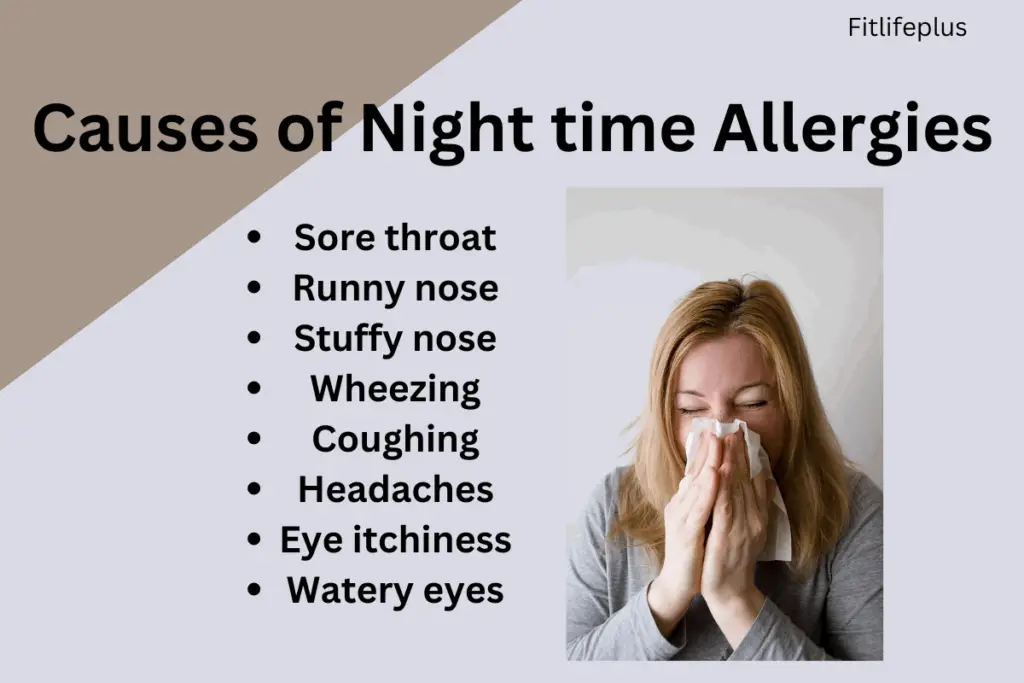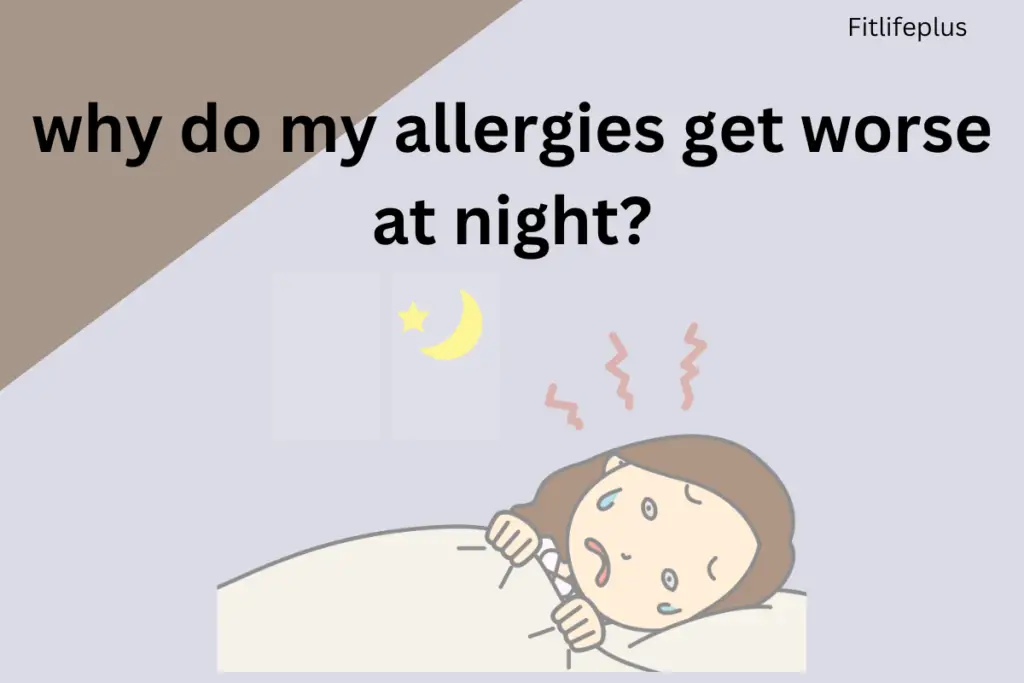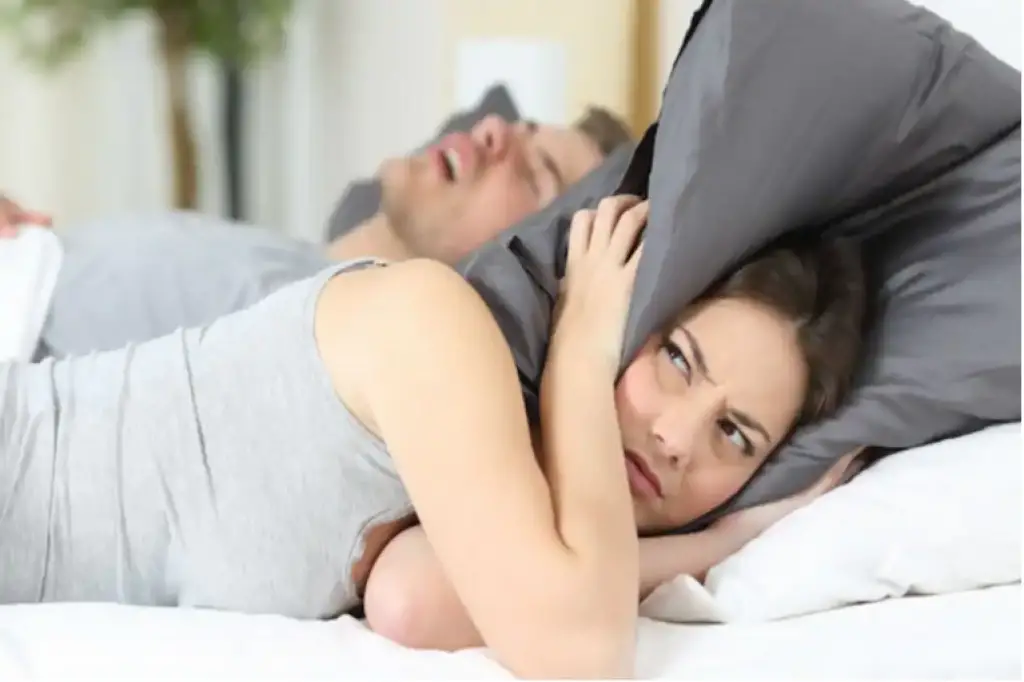In the cases of seasonal allergies, nighttime allergy is the common complaint of allergy patients. Difficulty breathing, runny nose, sniffling, and nasal congestion are all signs of allergies.
Allergies are annoying during the day and can get worse at night. Sleep is essential to function properly and benefit the immune system in fighting these allergens. At the same time, sleep deprivation can make your allergies worse.
In this article, we will cover why my allergies worsen at night and what you can do to prevent them.
Causes of Night time Allergies

Nighttime allergies result from the same allergens that cause daytime allergies. Though the same allergens are behind it, it feels a little worse during nighttime. Some common causes of nighttime allergies include pollens, dust mites, mold, cockroaches, pet dander, and dust particles.
Some common symptoms of nighttime allergies include:
- Sore throat
- Runny nose
- Stuffy nose or nasal congestion
- Wheezing
- Coughing
- Headaches
- Eye itchiness
- Watery eyes
Why do allergies get worse at night?
Your allergies can worsen at night due to increased exposure to the allergy triggers at nighttime. Your symptoms can also worsen if you are more aware of your allergies at night than during the day.
Here are some of the main reasons my allergies worsen at night.
Lying down deteriorates congestion.
When it comes to nighttime allergies, gravity isn’t friendly. When you lie, everything in your nose starts dripping down your throat. Due to the throat structure, it will cause wheezing, coughing, and difficulty in breathing as compared to the upright standing position.
You can get some pillows to prop yourself up to ease the congestion and the post-nasal dripping while you sleep.
Dust mite allergies
Dust mites are among the most common type of allergies that maximum allergy patients suffer from. Dust mites are present around the whole surface area of your household and bedroom surface.
If your body is sensitive to dust mites, you will constantly have to deal with a stuffy nose and nasal congestion that will get worse at night.
Pets sleep in the bedroom.
Pets in the bedroom at night can also worsen your allergy symptoms. The pet dander can accumulate on your carpet, rugs, or bedding. Undoubtedly your furry friend gives the best cozy snuggles, but sleeping together will not help any of you.
It’s an unpopular suggestion for allergic patients, and it’s best to keep their pets in separate rooms during nighttime.
Pollen allergies
Most people don’t know, but the pollen count worsens pollen allergies at night. The pollen count starts increasing at night, especially in the hours just before dawn. These pollens can settle close to the bed and the ground. The pollen count rises with the sunrise.
It is the main reason pollen is a significant factor for morning and nighttime allergies. However, compared to dust mites, pollens are way east to track in the house, clothes, and your pet’s fur.
Mold
Most of us hope never to deal with indoor mold, but it does happen. Here are some common symptoms of mold allergies.
- Cough
- Sneezing
- Runny nose
- Watery eyes
When you are allergic to mold, it triggers allergies and keeps you up at night, especially in the bedroom with an attached bath. To prevent it, clean the indoor mold as soon as you detect it. Scrub the surface till the mold is completely removed.
Cockroach allergies
People usually don’t talk about cockroach allergens. According to the studies, around 63% of the homes have such allergens. Ear infection and sinus infection are some of the most common complaints of people with cockroach allergies.
The fact that these insects are most active at night is why people relate it with nighttime allergies.
How to prevent nighttime allergies?

Despite the type of allergens triggering your allergies, I have a few practical suggestions from top-notch experts to relieve your symptoms and help you sleep better.
Clean the dust daily.
Try to dust your furniture with a damp and microfiber glove to ensure that you not only capture the dust but also spread it around. Vacuum the carpets regularly to remove the dust effectively.
Shower before bedtime
Getting a shower before sleeping is an ideal way to eliminate all the allergens in your body. Pollen can stick to your hair and skin throughout the day. Make sure your skin is clean, and then go to sleep.
It will reduce contact with allergens and will also improve your sleep quality.
Adjust your sleeping position.
Your sleeping position has a significant impact on your comfort. The proper place can make it easy for you to fall asleep. But it can also help in reducing the allergy symptoms at night.
Try sleeping on your side, as it will benefit nasal breathing and filter out the allergy symptoms.
You can sleep on your back with an elevated head to improve nasal breathing. Nasal breathing has many other benefits, like letting gravity drain the congestion.
Slow the mold and dust mite growth.
A dehumidifier can benefit from the proper condition to slow your house’s mites and mold growth. The perfect humidity levels are around 30 to 50%, and the temperature should be 70 degrees F or low.
Don’t sleep with your pet.
We all love our pets and want to be close to them and cuddle them all the time. But if you are allergic to dust or pet dandlers, sleeping in a different room at night is best to prevent the worsening symptoms.
You need to train your pet to sleep in its room. During the day, keep your pet in a separate room so that it doesn’t make any contact with the bedding, pillows, and mattress.
Anti-allergen bedding
You can buy bedding and pillows specially designed for people with different allergies. Such bedding is made up of anti-allergen material that is also resistant to indoor mold growth and dust mites. The smooth fabric of the bedding doesn’t let the pollens or pet danders attach to the bedding.
Close your doors and windows.
Opening the windows for the cool air to breeze in is tempting. But pollens, dust mites, and other allergens present in the air will come along. So to avoid allergy symptoms, closing the doors and windows at night is better.
Take allergy medications before sleeping.
According to your symptoms, take the counter medications your health care provider prescribes to relieve allergies.
FAQ’s
How to calm my allergies at night?
There are many effective ways to calm your allergies at night. It includes:
- Using air filter
- Closing the doors and windows
- Replacing curtains with blinds
- Washing your bedding daily or replacing it with anti-allergen bedding
- Keeping the room clean
- Making room a pet-free zone
Is it normal that my allergies get worse at night?
Allergies can worsen at night due to increased exposure to particular allergy triggers. Generally, the worst allergies at night include pollen, pet dander, dust mites, and mold.
What is the best position to sleep with allergies?
Sleeping upright where your head is raised above the body is the best way to tackle the congestion. Keep the head elevated so that the mucus will drain out with the help of gravity.
In which months is there the highest allergy rate?
In the United States, the spring comes at the start of February and lasts till the early summer. The tree pollination starts in the early tear, and the grass pollination begins in the spring and summer, followed by the ragweed in the last fall and summer.
Conclusion
There are many potential triggers for nighttime allergy symptoms, and no matter the type of allergy you are suffering, it can ruin your night’s sleep. But by following the above-mentioned allergen-reducing tricks, you will notice a decrease in your allergy symptoms, resulting in a peaceful night’s sleep.




